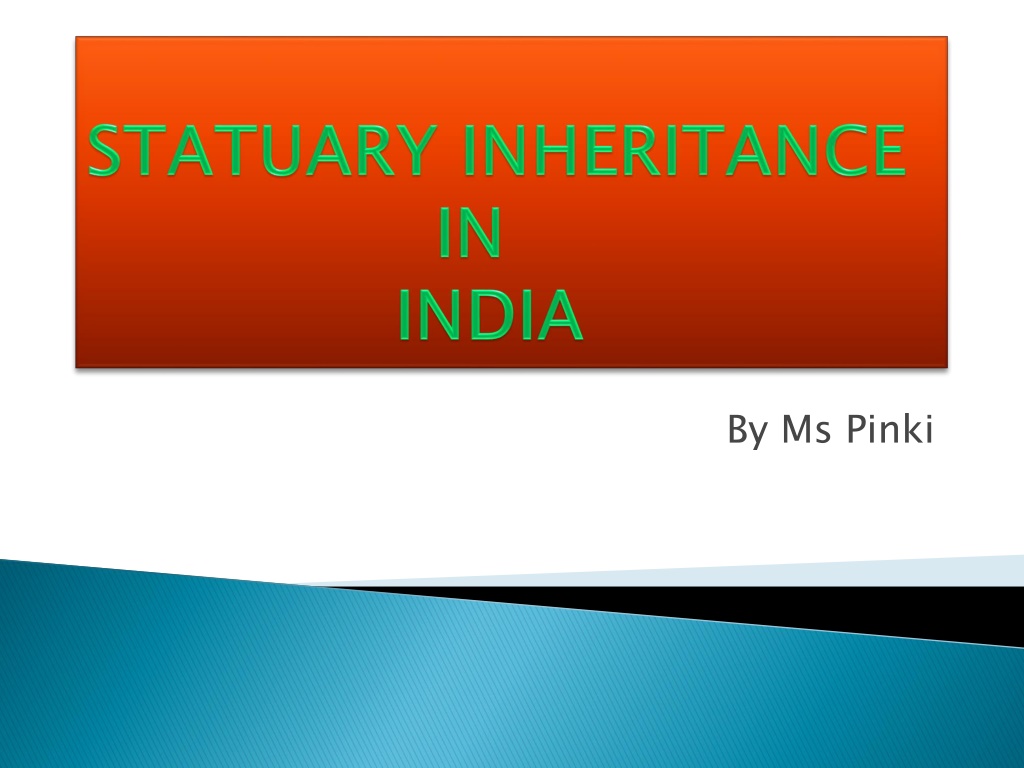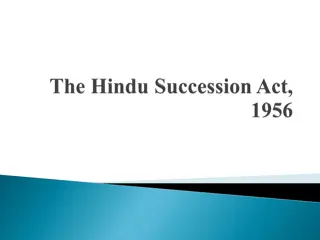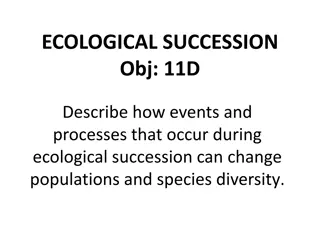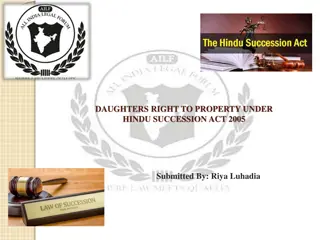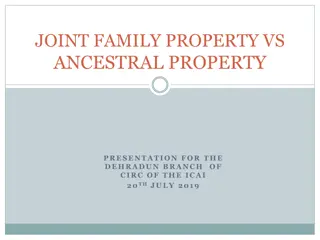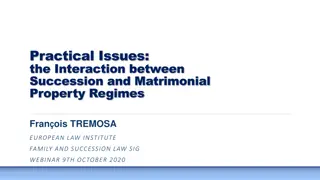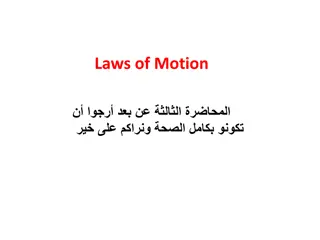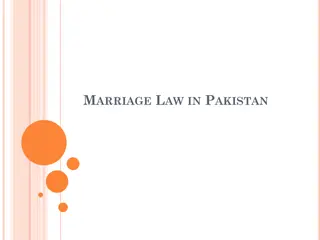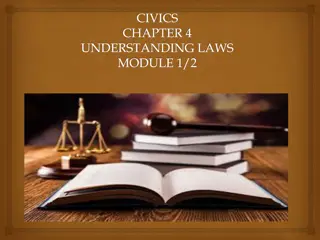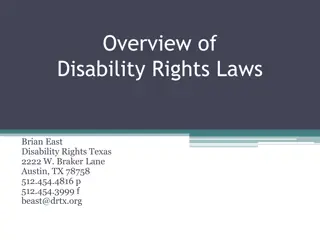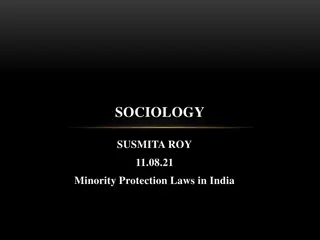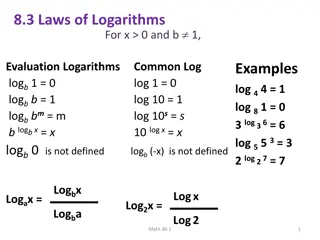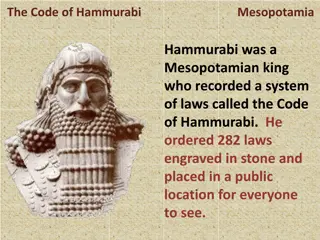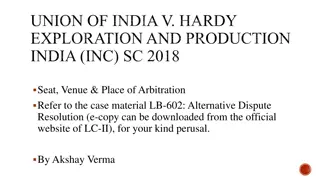Understanding the Laws of Succession in India
The laws of succession in India govern how a deceased person's property is inherited. Various methods such as wills, gift deeds, joint ownership, and partnership arrangements determine inheritance. Different laws apply to different communities like Hindus, Muslims, Parsis, Christians, and Jews. The Indian Succession Act, Hindu Succession Act, and Muslim Personal Law are some key legislations regulating succession. Heirs are classified into different categories based on relationship proximity. The absence of a will leads to intestate succession.
Download Presentation

Please find below an Image/Link to download the presentation.
The content on the website is provided AS IS for your information and personal use only. It may not be sold, licensed, or shared on other websites without obtaining consent from the author. Download presentation by click this link. If you encounter any issues during the download, it is possible that the publisher has removed the file from their server.
E N D
Presentation Transcript
Law of succession are the statuary rules about the inheritance of a dead person s property. Will is the primary method to decide who will inherit my property but other methods like; gift deed, joint ownership, partnership arrangements, pensions, provident funds and life assurance in its different forms are also there. Testamentary succession Non-Testamentary Succession
1. Constitution 2. Legislations Indian Succession Act, 1925 Hindu Succession Act 1956 Muslim Personal Law (Shariat) Application Act, 1937 Special Marriage Act, 1954. 3. Customs
India do not have uniform civil code, every religion or sects maintains special provisions Acts and Laws or customs related to most civil concerns so for succession also. The law on testate succession is governed by the Indian Succession Act, 1925 for all communities except Muslims. Hindus, Sikhs, Jains and Buddhist; for the non- testamentary or intestate succession/inheritance, the governing law is the Hindu Succession Act, 1956.
Hindus, Sikhs, Jains and Buddhist; for the non- testamentary or intestate succession/inheritance, the governing law is the Hindu Succession Act, 1956. Laws of succession applicable to Parsis; Indian Succession Act, 1925 specifically under section 50 to 56 of the Indian Succession Act, 1925. Laws of succession applicable to Christians and Jews; Indian Succession Act, 1925 specifically under section 31 to 49 of the Act. Laws of succession governing Muslims; for non- testamentary succession Muslim Personal Law (Shariat) Application Act, 1937 is applicable Muslim has died testate, the issue has to be governed under the Indian Succession Act, 1925 Laws of succession in case of inter faith marriages, under Special Marriage Act, 1954.
Adult Unborn Child Minor Lunatic Government
Heir means any person, male or female, who is entitled to succeed to the property of an intestate under this Act Main classes of heirs 1) Class I 2) Class II Subcategories 1. Agnates 2. Cognates 3. Full blood , half blood and uterine blood
(a) Firstly, upon the heirs, being the relatives specified in class I of the Schedule; (b) Secondly, if there is no heir of class II then upon the heirs, being the relatives specified in class II of the Schedule; (c) Thirdly, if there is no heir of any of the two classes, then upon the agitates of the deceased; and (d) Lastly, if there is no agnate, then upon the cognates of the deceased.
Under Section 10 of Hindu Succession Act 1956 class I heirs are; Wife or Wives Mother Son Daughter Children of Predeceased Son or Daughter Wives or husbands of predeceased Son and daughters
Class II heirs. Father Son s daughter s son/daughter, brother & sister Daughter s son s son/daughter, daughter s daughter s son/daughter. Brother s son/ daughter & sister s son/daughter Father s father/mother Father s widow & brother s widow Father s brother/sister Mother s father/mother Mother s brother/sister
If a Hindu female dies without a Will, her property would be distributed as follows: Son, daughter ( including the children of pre-deceased son/daughter) & husband Heirs of her husband Her mother & father Heirs of her father Heirs of her mother
In case of a Hindu female dies intestate and without any issue or any children or any predeceased children, any property inherited by her from her parents shall not devolve upon her husband or his heirs but revert to her natal family. Hindu female dies intestate and without any issue or any children or any predeceased children, then any property inherited by her from her husband or her father-in- law devolves upon the heirs of her husband.
Any person who commits murder is disqualified from receiving any form of inheritance from the victim. Conversion. Widow Remarrying.
The Muslim law of succession is a codification of the four sources of Islamic law, which are (1) The Holy Koran, (2) (2) The Sunna that is, the practice of the Prophet, (3) (3) The Ijma that is, the consensus of the learned men of the community on what should be the decision on a particular point. (4) (4) The Qiya that is, an analogical deduction of what is right and just in accordance with the good principles laid down by God.
Differences from Hindu Law No distinction between Moveable or immoveable property No right to property unless the proprietor dies No application of principle of Representation Female has equal right as of man but her share is always half than the man heir s share. Muslim law, the illegitimate child has no right to inherit property through the father
Muslim law recognizes two types of heirs, the first being Sharers, and the second being Residuaries. Sharers are 12 in number and are as follows: (1) Husband, (2) Wife, (3) Daughter, (4) Daughter of a son (or son's son or son's son's son and so on), (5) Father, (6) Paternal Grandfather, (7) Mother, (8) Grandmother on the male line, (9) Full sister (10) Consanguine sister (11) Uterine sister, and (12) Uterine brother.
No widow is excluded from succession. A childless Muslim widow is entitled to one-fourth of the property. a widow who has children or grandchildren is entitled to one-eighth of property. If a Muslim man marries during an illness and subsequently dies of that medical condition without brief recovery or consummating the marriage, his widow has no right of inheritance. But if her ailing husband divorces her and afterwards, he dies from that illness, the widow's right to a share of inheritance continues until she remarries.
A will made by a Hindu, Buddhist, Sikh or Jain is governed by the provisions of the Indian Succession Act, 1925 but not for the Muslims. Competency to make will: The testator should be Major Sound Mind Rightful Owner
Since 2005 after a new legislation girls also have equal share in the property of their father. Grandsons have the direct right in the property of their grandfather even more than their fathers. A child without marriage can inherit property of his father but not the mother of child will inherit any property.
